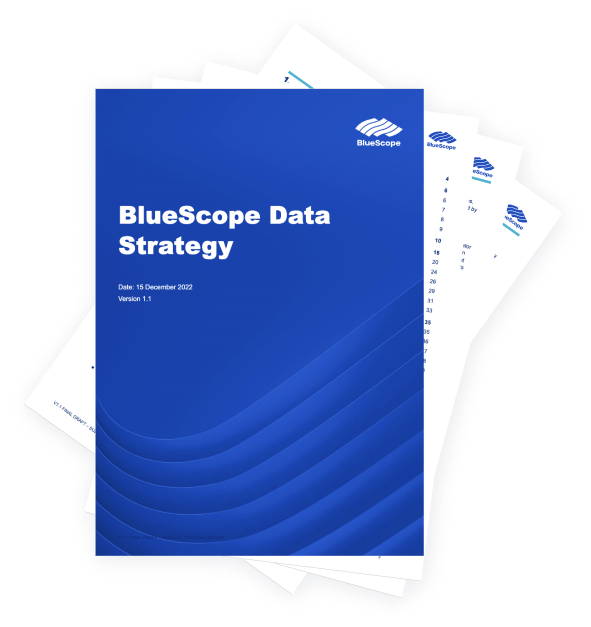People involved
- Data Strategy & Governance Lead
- Data Architect
- Data Governance Specialist
- Business Analyst
Key statistics
- 1 Corporate Entity
- 5 Regions
Engagement length
3 months
Client Background
BlueScope, an ASX 50 listed multinational organisation, is one of the world’s leading manufacturers of steel. They provide innovative steel materials, products, and components for a wide range of applications, including building and construction, automotive, white goods, and more. They are headquartered in Australia, with operations spread across North America, Australia, New Zealand, the Pacific Islands and throughout Asia.
BlueScope has ambitions to leverage the data within their ecosystem, positioning it as a strategic asset that can support insights across their business, transforming them into an effective, data-driven organisation. However, they face significant challenges within their existing enterprise data landscape and corresponding operating and data governance capability.
They partnered with Codex Consulting to establish a Global Data Strategy and corresponding flight plan, aimed at guiding and aligning their regional entities on best practices. Once established, this would trigger a raft of strategic data initiatives and investment, to uplift the data governance maturity across their organisation.

Understanding the Challenge
The project began with an initial in-depth assessment from Codex, where the current state of data maturity across BlueScope’s Business and IT teams was reviewed. This was supported by our structured Discovery framework, which allows us to effectively uncover key pain points and target state aspirations from stakeholders. Thanks to BlueScope’s collaboration, we were able to not only identify issues, but the key forces driving them. Our key observations included the following:
Federated Business Model
BlueScope’s history of operating for over 100 years history in a geographically dispersed business model adds complexity to its business, IT, and data landscape. As a result, there was limited alignment regarding the data strategy between corporate (HQ) and regional entities. Each region was in a different state of building new data platforms, yet all suffered from common issues relating to immature data governance.
Lack of Business Ownership
An adverse effect of operating in an IT and project led environment was that the business didn’t own data and were not engaged in the data governance processes. This has led to a poor data culture, where the business wasn’t empowered to capitalise on the power of data and insights.
Failure to Launch
Previous attempts to design and implement data strategies across BlueScope couldn’t progress, as they were all primarily high-level and management focussed. They lacked a detailed assessment of challenges, comprehensive implementation plans and supporting change management activities.
Low Data Governance Maturity
BlueScope was classed as ‘Aware’ on the Data Maturity Scale. It was identified that:
- There were no formal data governance groups or a business led data office.
- Only baseline data policies were in place with limited controls.
- Primitive frameworks were being used to manage data quality, master data, reference data, and metadata definitions.
- There was a lack of clarity on the source of truth for critical data sets, with self-service reporting without oversight or data quality controls.
Data Privacy & Literacy Issues
The lack of appropriate data controls and poor data literacy led to data security and privacy breaches, exposing BlueScope to potential reputational and pecuniary damages.
Lack of Data-Driven Decision-Making Capability
BlueScope’s data vision is to become a data-driven business. However, the existing data and analytics capabilities were focused on creation of IT assets (ingestion into a data lake), rather than the delivery of actual business use cases representing capability uplift.
Reporting Inefficiencies
Manual data collation from regional entities for centralised reporting across Finance, Sales & Marketing, People and ESG was inefficient, costly, time-consuming and riddled with quality issues.
Connecting the Dots
Once we had clearly documented and understood the key areas of concern, we were able to leverage our comprehensive Data Strategy Blueprint, and tailor it to BlueScope’s needs.
The aim was to deliver a clear, actionable plan that could be practically implemented. Led by our team of experienced industry leaders, cloud and data professionals, our five recommendations were to:
1. Secure endorsement and funding support from the Executive Leadership Team for a Data Strategy and adjoining roadmap.
2. Commit to the Data Vision through the introduction of data councils, formalisation of roles, and incremental establishment of business ownership of data, underpinned by a data literacy initiative.
3. Set up an Enterprise Data Platform by leveraging learnings and best practices from regional implementations, and ensure all corporate business units leverage this enterprise capability.
4. Start small with a Regional MDM pilot; learn, improve and assist with rollout in other regions.
5. Fast track regional adoption by setting up data management best practices, tool recommendations, policies and standard guidance frameworks.
Global Data Strategy
Detailed Initiative Roadmap
Data Governance Framework
Enterprise Data Standards & Guidelines
The key to achieving buy-in and adoption from the business included demonstrating how an uplift in data governance and data management processes would add value to the business and their processes.
21
Data Categories assessed against their maturity
93
Target state data components recommended
5
Strategic Documents
1
Global Reaching Roadmap to support a federated business plan
25+
Data challenges & opportunities identified
10
Global Business areas engaged across 3 regions
5
Strategic Recommendations
6
Key Data Initiatives
80+
Actionable Program Goals mapped out
Key Outcomes
Our recommendations included a Hybrid Governance Model, which involved both HQ and regional entities. This allows BlueScope to capitalise on its global assets, based on a ‘build once, share many’ paradigm.
Global Data Strategy
BlueScope’s new Global Data Strategy has helped identify and address key pain points and areas of concern related to its data governance and data management practices. Enabling BlueScope to develop a realistic vision for its data, and articulate the target state transitions across the short, medium, and long term.
A series of strategic recommendations were made, and classified into key data initiatives. The initiatives covered foundational elements such as establishment of councils and stewardship with clear agendas and responsibilities, as well as data management uplift around MDM, DQ and metadata.
This has allowed BlueScope Corporate to publish the enterprise data strategy and investment business case to both their ELT and the regional entities.
Detailed Initiative Roadmap
To implement the new Global Data Strategy, an actionable roadmap accompanied by a detailed rollout plan was created. It provides a clear timeline for implementation, and comprehensively details the initiatives, next steps, interdependencies, and milestones across three horizons – 90 days, 180 days and 5 years.
Data Governance Framework
Codex used an industry standard Data Governance Model to showcase the set of interconnected components which combined to reinforce an effective way to govern data at BlueScope. The Data Governance Framework is a long-lived foundational document that comprehensively breaks down each segment of the model to illustrate how it is practically applied at BlueScope.
The model covered:

Policies & Standards
A relevant set of regulations, cultural norms, industry standards and internal organisational policies that BlueScope needs to operate within.
Organisation
A definition of the individual roles, committees, charters, and decision rights; ensuring that data ownership, accountability and responsibility, is clearly understood at BlueScope.
Processes
A set of processes for managing data and for raising escalation requests as required.
Governance Controls
Data related controls that help manage risk within BlueScope. These controls ultimately rely on people exercising their skills and expertise, aided wherever possible by automated and measurable processes.
Tools & Technology
Fit for purpose tools to automate and improve data governance.
Enterprise Data Standards & Guidelines
Enterprise Data Standards and Guidelines were produced to ensure all BlueScope data teams had a reference point for implementing data governance within their environments.
The following standards and guidelines were covered:



